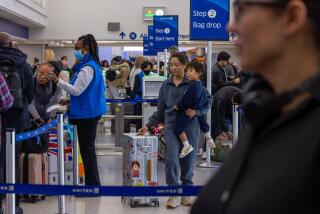Tour Operators Leave Hearts in L.A.
- Share via
Los Angeles boosters have never pretended that the City of Angels could compete head-to-head with the City by the Bay when it comes to cultural attractions. Or downtown nightlife. Or mass transportation.
But on Monday, as more than 5,000 travel industry types gathered at the Los Angeles Convention Center, tourism officials and tour operators from places as far-flung as Moscow and Rio de Janeiro -- and as close as San Francisco -- could hardly contain their astonishment: Los Angeles is a changed city.
“Downtown, especially, is like a whole new destination. It used to be a ‘no go’ zone,” said Laurie Armstrong, spokeswoman for the San Francisco Convention and Visitors Bureau. “Los Angeles is showing wonderfully here.”
The renewed wonderment about L.A. and attractions from the Walt Disney Concert Hall to the Getty Center is expected to translate into a windfall. The Travel Industry Assn. of America’s International Pow Wow, as its annual trade show is called, is where most foreign tours to the U.S. are booked each year, and operators were lining up Monday for Southern California venues. By lunchtime, Penina Momosea of Go Holidays in Auckland, New Zealand, had arranged for groups to visit Legoland California and Knotts Berry Farm -- but to stay in L.A.
Momosea said she hoped to bring 10,000 Kiwis to the U.S. this year, many of them to the southern part of the Golden State.
“People in New Zealand love the theme parks in California,” she said. “Our business is up.”
International travel to the U.S. is expected to rise 5% this year from 2003, according to industry projections, largely because the weakness of the greenback makes the U.S. an affordable destination for many.
In California, where tourism generates about $78.2 billion annually, business and leisure travel could increase 2.1% in 2004, according to the state tourism office in Sacramento. More domestic and international travelers to the U.S. visit California than any other state.
“We’re back to that feeling of excitement after being slightly subdued for the past three years,” said Cathy Keefe, a spokeswoman for the travel association. The $530-billion U.S. travel industry fell into a slump after the 2001 terrorist attacks.
Even before then, Los Angeles had struggled to attract big conventions, suffering from a relative shortage of downtown hotel rooms, compared with rival metropolitan areas, and a relative lack of activities or attractions easily accessible from its convention center.
But on Monday, foreign tour operators seemed enthusiastic about downtown Los Angeles as its very own destination: They praised it as safer and cleaner, with interesting restaurants open for more than just lunch and world-class culture within walking distance.
“I haven’t been here in 10 years, and Los Angeles seems very nice to me now,” said Alexandre Lima, who runs a Brazilian travel agency. “The downtown seems so safe. It’s great here.”
Several tour operators said they would put urban Los Angeles at the top of some lists, citing the Metro light-rail line as a key attraction for foreigners comfortable with traveling by subway. Others liked the Hollywood & Highland entertainment center, the Getty Center and, as usual, the theme parks.
Galina Redkina, a tour operator from Moscow, said that, thanks to Hollywood, the state and L.A. were natural draws for Russians. “California is very popular in Russia. We see it on the films,” she said. “I have a great impression of the city.”
That made LA Inc., the city’s convention and visitors outfit, happy. “We’re showing people that if you haven’t been to Los Angeles in the past five years, you really haven’t seen it,” said spokeswoman Carol Martinez.
Some things, however, are beyond boosters’ control: The United States this fall will begin fingerprinting and photographing millions of visitors from 27 European and Pacific nations who now are exempt from such procedures.
Since January, travelers from other countries have had their digital photographs and fingerprints checked against U.S. security databases. The so-called visa-waiver countries, whose residents don’t need to obtain advance permission for most short visits to the United States, will lose their exemptions from fingerprinting and photographing after Sept. 30.
“It’s a big problem for our business,” said Isao Yamagata, sales and marketing manager in Japan for Universal Studios.
More to Read
Sign up for The Wild
We’ll help you find the best places to hike, bike and run, as well as the perfect silent spots for meditation and yoga.
You may occasionally receive promotional content from the Los Angeles Times.






